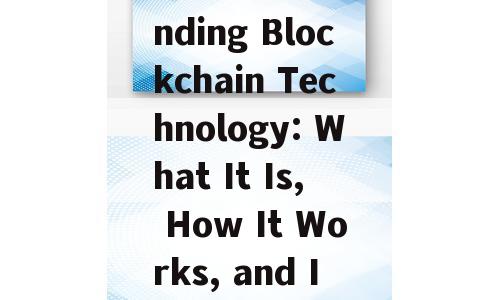Introduction:
In recent years, blockchain technology has emerged as a groundbreaking innovation with the potential to disrupt various industries. With its decentralized and secure nature, blockchain is not just a buzzword but a real game-changer. This article delves into the essence of blockchain, explaining what it is, how it functions, and its profound impact on the future.
What is Blockchain?
Blockchain is a decentralized digital ledger that records transactions across multiple computers. Unlike traditional ledgers that are stored in a central location, blockchain is a network of interconnected nodes that maintain a synchronized copy of the ledger. Each transaction is verified by the network, recorded in a block, and added to the chain, creating an immutable and transparent record.
How Does Blockchain Work?
The blockchain operates on a consensus mechani *** , where nodes in the network agree on the validity of transactions. There are several types of consensus mechani *** s, including Proof of Work (PoW) and Proof of Stake (PoS). In PoW, miners compete to solve complex mathematical problems, and the first to solve the problem gets to add a new block to the chain. In PoS, validators are chosen to create new blocks based on the number of coins they hold and are willing to "stake" as collateral.
The Process:
1、A transaction is initiated between two parties.
2、The transaction is broadcast to the network of nodes.
3、Nodes validate the transaction based on predefined rules.
4、Once validated, the transaction is added to a new block.
5、The block is then added to the blockchain, creating a chain of blocks.
Security and Transparency:
One of the most significant advantages of blockchain is its security and transparency. The decentralized nature of blockchain makes it nearly impossible to alter or corrupt the data. Each transaction is encrypted and linked to the previous transaction, forming a chain that can be traced back to the original transaction. This transparency ensures trust and eliminates the need for intermediaries.
Impact on the Future:
Blockchain technology has the potential to revolutionize various industries, including finance, healthcare, supply chain, and more. Here are some key impacts:
1、Finance: Blockchain has the potential to transform the financial industry by providing a secure and transparent platform for transactions. It can enable peer-to-peer lending, cross-border payments, and decentralized finance (DeFi) services.
2、Healthcare: Blockchain can improve the security and accessibility of medical records, ensuring patient privacy and reducing the risk of fraud. It can also facilitate the sharing of medical research and treatment data.
3、Supply Chain: Blockchain can enhance the transparency and efficiency of supply chains by providing a secure and immutable record of transactions. This can help reduce fraud, counterfeiting, and improve product traceability.
4、Real Estate: Blockchain can streamline the real estate transaction process by eliminating the need for intermediaries, reducing costs, and ensuring the security of property records.
Conclusion:
Blockchain technology is more than just a buzzword; it is a transformative force that has the potential to reshape industries and improve our lives. By understanding what blockchain is, how it works, and its impact on the future, we can better appreciate its significance and prepare for the changes it will bring. As blockchain continues to evolve, it is crucial to stay informed and adapt to this new era of digital transformation.















还没有评论,来说两句吧...